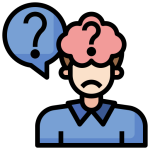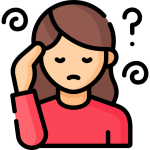Difficulty with Written Expression
Most people with aphasia experience difficulty with writing. An acquired difficulty with writing is sometimes called dysgraphia or agraphia. Often, a person’s writing resembles their verbal speech. Some people will find writing easier than speaking. People with aphasia might experience difficulty with writing that ranges from none at all to severe.
- Little to no impairment: Writing is intact with only minor errors. Someone might experience difficulty with word-finding in writing, similar to what they experience in speaking. This level of impairment is common in conduction aphasia and anomic aphasia.
- Mild impairment: Difficulty with word-finding and writing longer or more complex information. Spelling complex words is difficult.
- Moderate impairment: Able to write words and short phrases. Sentence structure and grammar are not present. Spelling errors are common.
- Severe impairment: Writing is severely impaired, and the person might not be able to write at all. Common in global and Wernicke’s aphasia.
Why is Writing Sometimes Challenging for People with Aphasia?
Writing can be difficult for a person with aphasia for two reasons. The primary reason is that the language impairment impacts the content of what they are able to write. However, many people with aphasia also experience physical difficulty with writing.
Aphasia is usually the result of damage to the left side of the brain. This is the side of the brain that controls the right side of the body. Because of this, many people experience weakness (hemiparesis) in their dominant hand. Some people even experience paralysis. This weakness can make it very difficult to hold a pen and control hand movements well enough to write.
Speech-language pathologists (SLPs) can work on writing in similar ways that they work on spoken language. Other members of your medical team can also help, such as an occupational therapist. They can provide exercises to strengthen muscles. They can also recommend different types of pens that might be easier to use.
Some people will find it easier to write using a “digital whiteboard” where a finger is used directly on a tablet device. A traditional whiteboard with a larger marker might also be easier than a pen and paper. Journals can be a great tool for working on writing, as well as keeping track of important information. There are also apps available that specifically work on writing skills.
Most people do make improvements in their writing over time. If writing is important to you, tell your SLP that it is a skill you would like to work on.
Click on the tiles below to learn more about the most common symptoms of aphasia.
Difficulty with Reading Comprehension

Difficulty with Language Comprehension

Difficulty with Written Expression

Difficulty With Spoken Language

Agrammatism

Dysprosody

Paraphasia

